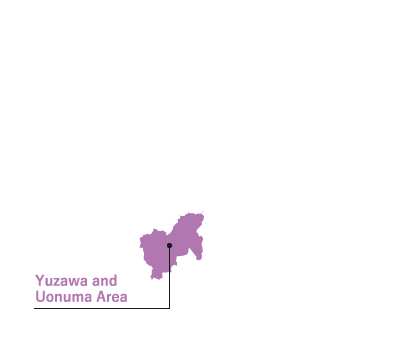
Appreciate Natural Colors and Traditional Beauty



1
Mount Hakkai Ropeway and Observatory
-
Mount Hakkai has been worshipped as a spiritual mountain since ancient times. It is the local area’s most popular place to enjoy autumn leaves. Mount Hakkai has been selected as one of the 200 most famous Japanese mountains and is known as one of the Echigo Sanzan (Three Mountains of Echigo) along with Mount Echigo-Komagatake and Mount Nakanodake.
The 5-minute ropeway ride travels through beautiful scenery up to the station at the top of Mount Hakkai. A further 5-minute walk takes you to the Mount Hakkai Observatory where you can enjoy a 360° panoramic view. On fine days the view extends as far as the distant mountains of Joshinetsu, the Sea of Japan and Sado Island.
Come and enjoy the breath-taking seasonal scenery from spring greens blanketed in the remains of the winter snow to the verdant greens under blue summer skies, autumnal colours and pure white winter mountain scenes.
The best time to climb the Hakkai Moutains is between June and November. The highest peak is Mount Nyudodake at 1,778m above sea level where a mountain hut is available to take a break. Although the mountain trails are mainly suited for advanced climbers, trekkers of all levels can take the ropeway to the forth station of Mount Hakkai and enjoy the mountain-top paths.

2
Uonuma no Sato
-
In the snowy basin of Uonuma, locals have long cherished the pleasures of each season and inherited ancient wisdom born from a life in harmony with nature.
Uonuma no Sato sits in the idyllic countryside that spreads out around the base of Mt. Hakkai. It was born from a desire to share the traditions of “snow country” Niigata and the peaceful lifestyle of the Uonuma region with visitors. The brewery of esteemed sake-maker Hakkaisan takes center stage, complemented by Hakkaisan Yukimuro, which contains a cafe, shop, and kitchenware center, along with soba noodle restaurant Sobaya Nagamori, sweets store Satoya, and plenty more.
Join a brewery tour to see the “snow storehouse,” where over 1,000 tons of snow is placed each year to naturally keep it at a temperature of around 4°C, allowing sake and food to be stored throughout the year.

3
Saifukuji Kaizando Temple
-
Saifukuji has 500 years of history. Many visit the temple because Ishikawa Uncho's artwork -- sculpture, paintings, and lacquer craftworks. All of his works are wonderful, especially the colorful sculpture on the ceiling. Please come and see them with your own eyes!

50 minutes by car
4
Shioritouge Pass
-
A mountain pass on Route 352. This pass is known as a place you may see the natural phenomenon of clouds floating like waterfalls in the early morning. We also recommend it as a place to view the fall foliage, from mid October to early November.

5
Lake Okutadami
-
Lake Okutadami is a man-made lake formed by the construction of the Okutadami dam, its water tank capacity is 600,000,000 square meters. It was constructed in 1961. In Edo period, the place was known as silver mines, so it is also called Lake Ginzan(The Silver Mountain). In fall, you can enjoy the color of the leaves of native beech forest with yellow and brown, also red, dark red, purple, vermillion of Japanese maples. From late May to early November, popular Okutadami Lake Tour Boat is operated. From Late My to June you can enjoy the contrast scenery of unmelted snow and green color of the young leaves over the mountain. In July and August, the color of forests in the mountain seems darker ,which we feel more beautiful than the blue Lake. Once you go out to the deck from the cruise ship, breeze blowing through the ship makes you feel very comfortable, so it's worth trying. In addition to the forty-minute lap of the lake, there is also a route to the popular Oze national park, popular with hikers. Nearby accommodations, hot spring bath, and camping sites are available.
It is not to be missed to take Okutadami Silver Line, as it was constructed for delivering construction materials to build the dam, which has 19 tunnels in total, its total length accounts for 18km out of 22km of the total length of the road. You must try at least once since it its very rare in Japan.
【Man-made lake】
●Maximum depth: 150meter
●Total area: 1,150ha
●Height : 750m

6
Ojiya Nishikigoi no Sato
-
Ojiya City is the proud birthplace of “nishikigoi” (colored carp), nicknamed “swimming jewels.” Emerging around 200 years ago due to a unique mutation, Ojiya's residents have devoted themselves to researching and enhancing this vibrant fish. Today, nishikigoi have evolved into a magnificent species, officially recognized as the ornamental fish of Niigata Prefecture in 2017.
Nishikigoi no Sato is a one-of-a-kind exhibition facility exploring the history of Nishikigoi. Here, visitors can marvel at these exquisite fish in a Japanese garden with bridges and waterfalls, showcasing 200 specimens from 15 different varieties.

































































